Text
Writing Workshop Week 1: Show & Tell
Hello, writers of tumblr! It’s @bettsfic again with this week’s generative workshop.
Today we’re doing what might be my favorite class activity: Show & Tell.
You might be thinking, do you teach kindergarten or something? No, I teach college. But my students are often weary, downtrodden 20 year olds who are more than happy to go back to basics. Tumblr—being a website of people who care deeply about things and share that passion with others—seems like a great place to host Show & Tell.
Speaking of basics, let’s first talk a bit about…
The Writing Identity
The goal of many writers is to become better at writing. While I think this is an admirable goal it’s also a complicated one, because good writing is entirely subjective. Everyone has their own definition of what good writing looks like based on their knowledge base, history, and personal tastes. And so I often encourage my students, before they begin their journey of becoming a better writer, to step back and ask themselves, “What does good writing look like to me?”
And that’s the thing: you can’t really become a better writer. You can become a more patient writer, with the ability to write and revise multiple drafts of a work. You can become a more ambitious writer, with the ability to write longer stories and deeper themes. You can become a more detailed writer, with the ability to render images and the small details of living that maybe other people don’t notice. Writing is a skill that requires practice, but it also requires joy. You have to enjoy the work more than you fear the potential for failure. And to enjoy the work, you need to honor yourself, your interests, and your ideals. In other words, to become a better writer, you have to become more you.
I remember when I first started writing, I frantically sought out writing advice. I clung to simple adages and rules: active verbs are stronger than passive verbs; remove words like “think” and “realize” and other indicators of your characters’ interior experiences; take out adjectives and adverbs. If you were to adhere to all this advice, your writing wouldn’t become stronger, it would become colder. You would write like Hemingway. There’s nothing wrong with Hemingway, but Hemingway already did Hemingway, and that means you’re free not to be Hemingway.
Don’t we read to feel closer to people, to experience that which we couldn’t otherwise experience? The beautiful thing about prose is that it’s the only medium that conveys consciousness, because language is the way we contain our thoughts, and writing them down offers others the chance to understand them. E.M. Forster in his book Aspects of the Novel says that the only difference between a character and a person is that a character’s secret inner life can be known, but a person’s can only be understood in observed behavior. Novels are stories of consciousness; biographies are stories of deeds.
In my early days as a writer, those inane adages of “good writing” began to weigh on me, and I found myself frequently opening a blank document and telling myself, “I’m just going to write something for fun, for me, and so I don’t have to follow any rules.” Every time, that lawless thing I wrote would become better than anything I’d written when I followed the rules. And in this case, “better” means I was proud of it; in writing as close to myself as I could, I was able to help my technical skill reach the level of my personal taste.
Good writing advice doesn’t spout shallow adages of what should be, it tells you all the things that could be; it opens your mind to possibilities and techniques. “Should” restrains creativity; the entire point of writing is to be creative. To be creative means to make something that has never existed before. And so one of the first things I tell my students is: You already know everything you need to know about your own writing. You already have good and important stories in you. You just have to sit down and write them.
“Show, Don’t Tell”
One such adage that still really gets to me is “show, don’t tell,” which a lot of writers believe. Many people take it to mean that you should describe the exterior circumstances of your narrator in order to allow the reader to interpret meaning. Instead of describing how your narrator feels, these people would rather have you describe their facial expression. But if you’re so interested in rendering the exterior rather than the interior, you’re better off becoming a director.
Others take it less literally: you show your story instead of tell your story, which, sure, is a valid personal belief for your own work but it’s ambiguous and impractical, and also denies the nature of people to tell stories. Fairy tales and fables are stories that are told. Telling stories came long before showing them.
In some ways, “show, don’t tell,” can be useful. If you spend a thousand words of character A lovingly and carefully describing every detail of character B, you don’t then need to say something like, “She was pining for him,” because you’ve allowed your description to do that work for you. So no, you don’t need to say it, but maybe you want to. Maybe you want to make it inarguable that character A is pining for character B; you don’t want a reader to say, “I think she’s paying that much attention because she wants to kill him and she’s looking for his weak points.”
And so that’s what it comes down to—choice. Ultimately, writing is about making decisions, and those decisions are stronger when you understand all your options.
Behind the adage is a more difficult truth to swallow: prose is both infinite in its potential and also frustratingly limited, because you have no control over your audience. You can lovingly describe every snowflake that falls in a blizzard, and your reader will be taking their own meaning from it—for people who can mentally visualize things, it’s the images their mind conjures; for those who can’t, it’s a mass of facts. And there are also those who are sleepy and missing details, or who are skimming to get to the bits they’re most interested in, or who accidentally dropped their book in the bath and now the bottom half of every page is warped and unreadable.
Or you can say, “It snowed.”
No matter what your beliefs are on “show, don’t tell,” the truth is that it’s a false dichotomy. The very nature of prose is to navigate this divide. Some stories call for more showing, for example when your narrator is at a distance, when we don’t have much access to their thoughts or feelings. Other stories will ask you to tell, especially if we’re deep in your narrator’s head and they’re giving us everything. Showing lends itself to setting, imagery, and plot. Telling lends itself to character, voice, and style. One is not inherently better than the other, in the same way that a screwdriver isn’t better than a hammer—the tool you use depends on the task at hand.
Any time you encounter a trite rule in writing, it’s usually pointing to something much greater and more fun to think about. In this case, showing and telling are two integral tools in meaning-making. For this week’s activity, we’re going to use both show and tell to make meaning.
Prompt time!
In Donald Barthelme's essay “Not-Knowing,” he calls objects magical. “What is magical about the object is that it at once invites and resists interpretation. Its artistic worth is measurable by the degree to which it remains, after interpretation, vital.”
So what does that mean? Although this essay is a hot mess (lovingly), part of its intended work is to be a mess. In fact Barthelme describes the mess of his desk and allows it to define him. It’s covered in coffee cups, cigarette ash, unpaid bills, and unwritten novels. In reality, those objects are just objects, but when rendered in prose, they give us an impression of this particular world and the character within it. The writer renders; the reader interprets. The things we own, that mean something to us, are also things that can define us. Who is the person who carries a leather wallet embossed with their initials, with the inside holding credit cards and a stack of neat bills? Who is the person who carries a canvas wallet with a faded Punisher logo on it, attached to a chain, and the only thing inside it is a Subway rewards card?
Objects are important. Especially in this world we live in where so many things have become virtual, tangibility will always be integral to us. We are a species that reaches out and touches. We like to hold things in our hands. We love things which cannot love us back.
For this week’s prompt fill, I want you to find a magical object for Show & Tell. Ideally, it’s something with a long personal history that’s important to you. Maybe it’s the object you would save in the event of a fire, or maybe it’s something you lost long ago.
First, I’d like you to show us the object by describing it. Then, tell us the story of it.
You can write about how you acquired it and the memories it conjures. Allow yourself to link and associate memories and feelings. Don’t box yourself in too much—just see where it takes you.
But you can also put a spin on it. Here are some ways you can do that:
If you want to try fiction, you can write the same story about your favorite character’s beloved object, or you could completely make up an object and its history.
If you want to try something experimental, you can write a story from the perspective of the object, and maybe its beloved thing is you.
If you want to try poetry, write a poem of your object. This is a separate lesson, but T.S. Eliot’s concept of an objective correlative may be illuminating to consider.
The purpose of this activity is to dig through your memories and/or observations, connect them, and use something external to conjure meaning from them. You begin with what your object is and it will eventually lead you to what it means.

Questions? Ask ‘em here before EOD Tuesday so @bettsfic can answer them on Wednesday. And remember to tag your work #tumblr writing workshop with betts if you want her to read your work and possibly feature it on Friday!
And, for those just joining us: @bettsfic is running a writing workshop on @books this month. Want to know more? Start here.
256 notes
·
View notes
Text
btw most universities to my knowledge keep their reading lists behind access barriers (ie. only students enrolled at the institution on the course in question can see them) so i thought i’d just let you all know that durham university has all of its reading lists available online for free without needing student access. do with this information what you will.
27K notes
·
View notes
Text
writing cheats
i know i’ve probably written about these all individually but i’m putting them together in one post. these are writing tricks that are extremely cheap and dirty; when you use them it feels like cheating and honestly by posting them i’m probably exposing all the easy moves in my own work, but more than a writer i am a teacher, so here you go, some writing cheats that have never steered me wrong.
quick character creation
what’s really annoying is when you have two characters sitting at a restaurant or something and the server has to come by. to what degree do you describe the server so that it’s clear they’re just a background character but that they’re not just a faceless form, so that the world has texture without taking up too much space on the page? rule of three, babeyyy: two normal things and a weird one.
she had pale skin and blue eyes but her hair was dyed black like a 2010 emo kid.
he was tall and broad, and he wore a sweatshirt with an embroidered teddy bear on it.
the woman stood there comparing the prices of toilet paper. she had a short angled bob and carried a keychain the length of a trout.
why does it work? it gives the reader something to hang onto, a brief observation that shows the world exists around your narrator. it also works when introducing main characters, but there’s so much action going on that you can’t take time to write a rich long paragraph about them. all you need is a little hook.
quick setting creation
i used to TOIL over descriptive paragraphs. for years i was like, description is my weakness, i must become better at developing imagery. i believed this because a famous writer once projected a paragraph i had written onto a screen and asked my cohort, “count how many images are crafted in this paragraph.” there were none. none! my friends were sitting there like, “we are TRYING” but they couldn’t find any.
i would say that after years of studying imagery development at the sentence level, i am, perhaps, competent at it, but what was more helpful was for me to shrug and tell myself, “i’m just not a writer who does that.”
anyway. my cheat is thus:
there’s not much you can assume about your audience. the audience is not a homogenous whole. but your ideal audience is something you can guess at, and that means you can play around with their existing knowledge and expectations.
if you say your characters are in a tacky shit-on-the-walls restaurant, if your ideal reader is an american who went to restaurants during the maximalist era of franchise design, they will conjure their nearest memory of one of those places. and for those readers who aren’t familiar with it, they’ll use other context clues to conjure that space. the point is, you don’t have to list every single stupid license plate nailed to the wall. you can leave it as one detail of one sentence and let your reader extrapolate from there.
if i say the dentist’s office looked like a gutted 90s taco bell, maybe no ideal audience would have ever seen a place like that, but a lot of people can mentally conjure a dentist’s office and a 90s taco bell and overlay them together to create a weird and fun image.
you can go even simpler than that: a bathroom the size of an airplane lavatory. a tiny studio apartment with a hotplate instead of a stove. a mansion with a winding stairwell. the point is that you want to define the size of the space and its general vibes.
in some ways detailed description can be overrated, because your reader conjures images even in absence of them on the page. and for those readers who can’t mentally conjure images, it doesn’t matter anyway; they take you at your word. the trick is to figure out what details are unexpected, relevant to understanding the story and its characters, and those are the things that you add in.
one other note: after working with hundreds of writers on drafting, for *most* of us it’s difficult to develop images and establish setting in a first draft. it’s nearly always something to be saved for a second or later draft. i think it’s because while we’re writing we tend to put character and action first.
nail the landing
there’s a joke i heard once from a writer i really admire: “you know it’s literary fiction if the story ends with a character looking at a body of water.”
and god it’s so painfully sad and true how easy it is to nail the landing of a given story by ending on a totally irrelevant piece of imagery. the final beat of a story followed by your character looking up at the sky and seeing a flock of birds in the shape of a V flying past. or maybe they’re sitting in their car and they count the rings of a nearby church bell. or maybe they watch an elderly couple walk down the sidewalk hand-in-hand. i don’t know!! when in doubt shove an observation, an image, whatever, something neutral at the end and it’ll sound profound.
(this cheat is the only one that can really bite you in the ass because if the image is too irrelevant you risk tonal incongruity. for use only in the most desperate of times.)
sentence fragments
when writers ask me how to punch up their writing or start developing their own style, my go-to advice is to give up the idea of a complete sentence. fuck noun-verb-object. if you have a series of character actions, knock off the sentence subjects like in script action. if the clause at the end of your sentence is particularly meaningful, don’t separate it with a comma but a period and make it its own thing. if your character is going through something particularly stressful or heinous, that bitch is not thinking in complete thoughts so you don’t have to convey them that way. make punctuation bend to your will!!
rhetorical moves
this one opened a lot of doors for me stylistically. remember that famous writer who called me out on my lack of imagery? i always thought his prose was beautiful, that he’s one of the best living prose writers, etc. once i learned more about rhetoric though, i realized he just employed it a lot.
usually when we talk about beautiful sentences it means a sentence that uses rhetorical devices. the greeks were like, you know what, when we give speeches there are certain ways to phrase things that make the audience go nuts. let’s identify what those things are and give them names so we can use them intentionally and convince people of our opinions.
i love shakespeare, i really do, but one of the big reasons he’s still a household name today and his plays are still performed is because every sentence of every goddamn play utilizes a rhetorical device. the audience is hard-wired to vibrate at the sound and cadence of his writing, like finding the spot on a dog that makes their foot thump. for five hundred years, william shakespeare has been scritching that spot for us.
i have no idea why, cognitively, rhetorical devices are so effective. i’m no rhetorician. all i know is that well-deployed anaphora makes a reader want to throw their panties on stage. my intro to rhetorical devices was the wonderful book the elements of eloquence by mark forsyth, a surprisingly fun read! hopefully that will open some doors for you the way it did for me.
the downside to this is that once you know rhetorical devices, it’s like learning how the sausage is made. on one hand, as a writer, you’ll have a lot stronger grasp of style, but as a reader good prose loses some of its magic.
pacing it out
many writers, myself included, rely on the tried and true “he bit the inside of his cheek” or other some such random action to help pace out dialogue. one time my thesis advisor sat me down and said “you’ve got to take all of those out.”
“all of them?” i said.
“all of them,” she said.
i thought, but that will weaken the text! it didn’t. once i cut what i came to call cheek-biter sentences i never went back. and now when i edit for other people i’m like, look i know where you’re coming from but just cut all these out and see how the scene stands. if it doesn’t feel right you can put some back in. a lot of times when you’re drafting you put those in the way some people say “um.” they’re just sentences you jot while you’re thinking of what the other character says, so from a writing perspective it seems like you’re pacing, but readers don’t read it that way. they just want to get to the next line of dialogue.
but sometimes you really do need to pace out a scene and i think there are other ways to do that that don’t rely on banal physical movements, such as:
interiority: a sentence or paragraph of relevant cognition, bonus points if you weave in background context. good interiority defines the voice of your writing.
observations: i know i just said description is overrated but idk sometimes you just need a character to note the back and forth clacking of one of those desk ball toy things.
character texture: maybe your character notes something about the person they’re talking to. a wilted pocket square. a mole that looks like it needs looked at by a dermatologist. a scar on their forehead. some detail that deepens or complicates our understanding of a character.
narratorial consciousness and access
this one is less a cheat and more a problematic opinion i have that doesn’t win me any popularity in writing circles.
i believe that if you’re writing in first person or close third or any narration which is dedicated to the mind of one character, you are only ever obligated to convey the experience of that character’s consciousness. and nothing else.
by that i mean, if your point of view character is unobservant? then they’re not going to even notice the flight attendant is missing one of their canine teeth. if your pov character is focused and obsessive, they’re going to think lavish, detailed paragraphs about that which they’re obsessed with and have no acknowledgement of the rest of the world. if your pov character has no understanding of time, does your story even need to be linear?
defining the scope of a narrator’s cognition early on can give you parameters in which to work. even if you don’t consciously do this, you still do it. if you write in third person limited present tense without really thinking about it, that’s your scope. i’m just pointing out you can choose to do it differently. you get to define your narrator.
whenever we talk about narration we also talk about information access and the order of information being revealed/conveyed. writing must always be in order; even if you’re writing multiple concurring things, it still has to be rendered on the page in order one after the next, because the human mind can’t read two sentences over top of one another.
if we’re restricted to the mind of a character, that means we’re also restricted by their knowledge and experiences, and this can be used to your benefit. i don’t want to take too much space for this but i do talk more about the relationship between narration and reality here.
in short, you the writer get to chose
what the reader knows,
in what order they know it, and
its relationship to the presumed real events of the story, which develops the (un)reliability of your narrator
okay going to cut this off now before i go on more rants about narrative scope. i hope you found this helpful and go on to put some of these nasty lifehacks in your own writing!!
7K notes
·
View notes
Text
Looking for a random cause of death for a character? Click here.
Looking for a random city? Click here.
Looking for a random city that people have actually heard of? Click here.
Need a random surname for a character? Click here. (They also give prevalence by race, which is very helpful.)
Helpful writing tips for my friends.
314K notes
·
View notes
Text
Skip Google for Research
As Google has worked to overtake the internet, its search algorithm has not just gotten worse. It has been designed to prioritize advertisers and popular pages often times excluding pages and content that better matches your search terms
As a writer in need of information for my stories, I find this unacceptable. As a proponent of availability of information so the populace can actually educate itself, it is unforgivable.
Below is a concise list of useful research sites compiled by Edward Clark over on Facebook. I was familiar with some, but not all of these.
⁂
Google is so powerful that it “hides” other search systems from us. We just don’t know the existence of most of them. Meanwhile, there are still a huge number of excellent searchers in the world who specialize in books, science, other smart information. Keep a list of sites you never heard of.
www.refseek.com - Academic Resource Search. More than a billion sources: encyclopedia, monographies, magazines.
www.worldcat.org - a search for the contents of 20 thousand worldwide libraries. Find out where lies the nearest rare book you need.
https://link.springer.com - access to more than 10 million scientific documents: books, articles, research protocols.
www.bioline.org.br is a library of scientific bioscience journals published in developing countries.
http://repec.org - volunteers from 102 countries have collected almost 4 million publications on economics and related science.
www.science.gov is an American state search engine on 2200+ scientific sites. More than 200 million articles are indexed.
www.pdfdrive.com is the largest website for free download of books in PDF format. Claiming over 225 million names.
www.base-search.net is one of the most powerful researches on academic studies texts. More than 100 million scientific documents, 70% of them are free
212K notes
·
View notes
Text
In case anyone is having a bad night:
Here is the fudgiest brownie in a mug recipe I’ve found
Here are some fun sites
Here is a master post of Adventure Time episodes and comics
Here is a master post of movies including Disney and Studio Ghibli
Here is a master post of other master posts to TV shows and movies
*tucks you in with fuzzy blanket* *pats your head*
You’ll be okay, friend <3
2M notes
·
View notes
Text
Some warm poetry, for cold evenings:
Molly Fisk, “Winter Sun” (We can make do with so little / just the hint of warmth, the slanted light.)
Pat Schneider, “The Patience of Ordinary Things” (It is a kind of love, is it not? / how the cup holds the tea.)
Barbara Ras, “Bite Every Sorrow” (You can speak a foreign language, sometimes / and it can mean something.)
Jack Gilbert, “Failing and Flying” (Everyone forgets that Icarus also flew.)
Lisel Mueller, “Things” (Even what was beyond us / was recast in our image; / we gave the country a heart, / the storm an eye)
Rabindranath Tagore, “On the Seashore” (The sea plays with children, and pale gleams the smile of the sea-beach / On the seashore of endless worlds children meet)
John O’Donohue, “Matins” (May I live this day / Compassionate of heart / Gentle in word / Courageous in thought)
Wallace Stevens, “The House Was Quiet and The World Was Calm” (The summer night is like a perfection of thought. / The house was quiet because it had to be)
Brian Patten, “Inessential Things” (Cats remember what is essential of days)
Emily Dickinson, “Simplicity” (How happy is the little stone / that rambles in the road, alone)
Yi Lu, “Valley’s Green” (flowers like tiny saucers — little bowls — little cups / filled to the brim with their own colors)
Jacques Prévert, “How to Paint a Bird’s Portrait” (When the bird comes / if it comes / observe the most profound silence)
Archibald MacLeish, “Eleven” (Happy as though he had no name, as though
/ He had been no one: like a leaf, a stem,
/ Like a root growing…)
Denise Levertov, “A Woman Alone” (Then / self-pity dries up, a joy / untainted by guilt lifts her. / She has fears, but not about loneliness)
Richard Brautigan, “Your Catfish Friend” (I’d love you and be your catfish / friend and drive such lonely / thoughts from your mind)
Linda Gregg, “The Letter” (I’m not feeling strong yet, but I am taking
/ good care of myself)
Andrew Lang, “Ballade of True Wisdom” (And I’d leave all the hurry, the noise, and the fray, / For a house full of books, and a garden of flowers)
Ada Limón, “The Raincoat” (my whole life I’ve been under her / raincoat thinking it was somehow a marvel / that I never got wet.)
Jorge Luis Borges, “The Just” (These people, unaware, are saving the world)
Wendell Berry, “The Peace of Wild Things” (I rest in the grace of the world, and am free.)
12K notes
·
View notes
Note
okay, over the summer i read Our Homesick Songs by Emma Hopper and it really helped to inspire the novel i'm working on right now—one where the setting sort of has a character arc of its own? and now i'm reading The Monsters of Templeton by Lauren Groff and it has a very similar situation with the setting being its own character. is this a litfic niche??? are there more of these books??? because if they are i want to read them and since you introduced me to both Emma Hopper and Lauren Groff you seem like the best person to ask about this
I don’t know if this is necessarily a litfic niche, but I have seen in it litfic a fair amount! But I don’t think it’s exclusive to litfic at all though, you also see (often small-town) settings as character in genres like horror and mystery, or in a grander sense a lot of fantasy. Monsters of Templeton is actually by a large margin my least favourite Lauren Groff book, but she tends to do this in her work a lot. Her stuff is all very setting-y, so I’d recommend her other work as well if you’re enjoying Monsters of Templeton and haven’t read her other work yet. My copy of her newest book, Matrix, just arrived and it looks so freaky I am so excited to read it.
I think The Pump by Sydney Warner Brooman might be exactly what you’re looking for!! It’s an interconnected short story collection set in a town with a poisoned water supply. It’s an amazing use of setting as character (plus the queer & non-binary rep is *chef’s kiss*.
Everything Under by Daisy Johnson might also be a good one! Daisy Johnson writes with super strong sense of place, and this is a novel where the setting is so intertwined with character and story. Her collection Fen also has very strong sense of place and develops the setting as a character across the whole collection.
For something super weird, Untold Day and Night by Bae Suah is set in a surreal version of Seoul where the city is basically...disintegrating on the plane of reality and time?? It’s wild but very setting-as-charactery! It’s pretty different from the two books you mentioned, and extremely weird in every possible way, but also a very unique use of setting. It’s also cool because ‘setting as character’ tends to happen in smaller, more intimate settings, but this book does it with an entire, actual city.
And finally I’d recommend Betty by Tiffany McDaniel! It’s set in the same town as McDaniel’s other novel, The Summer That Melted Everything, and while TSTME probably has a stronger sense of setting as character in the way you're describing, I honestly did not like that book but I loved Betty and it also really constructs a character out of the setting and takes that setting on a journey along with the characters.
29 notes
·
View notes
Photo
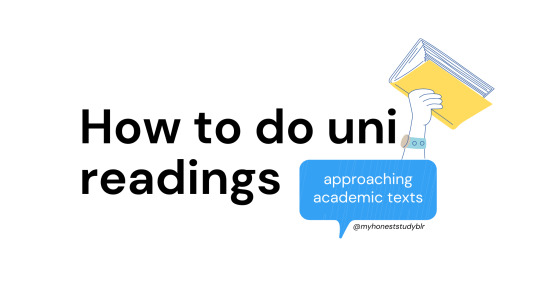
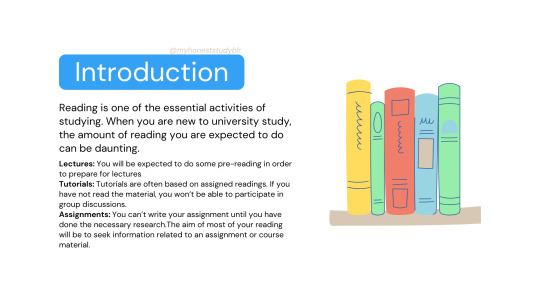
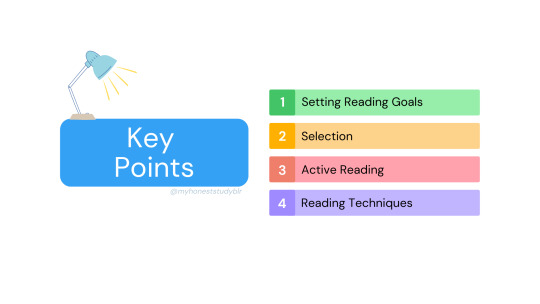
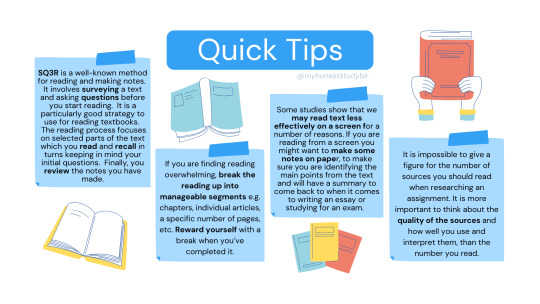

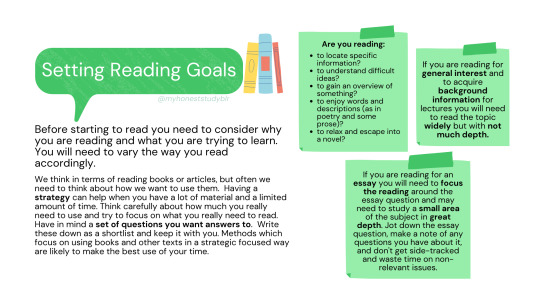
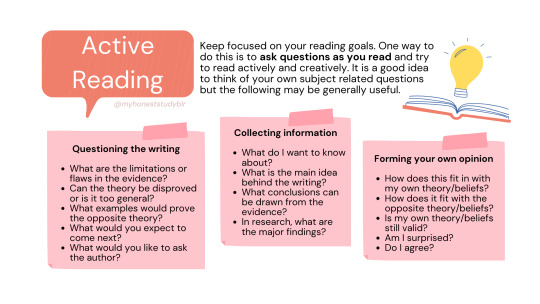
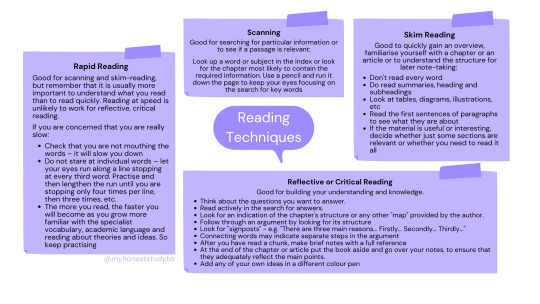
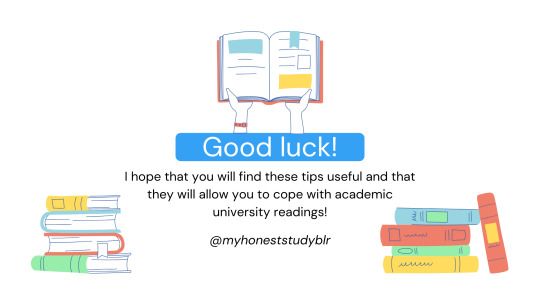
my masterpost | my studygram | ask me anything
[click images for high quality]
Other advice posts that may be of interest:
How To Stop Procrastinating
How To Study When You Really Don’t Want To
Active Revision Techniques
7K notes
·
View notes
Photo
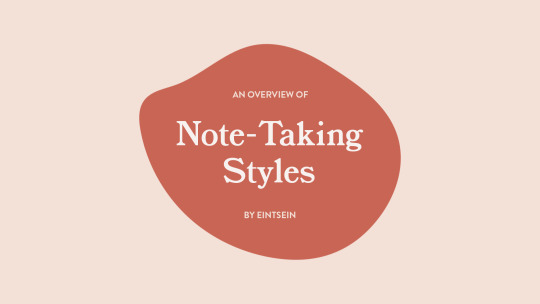

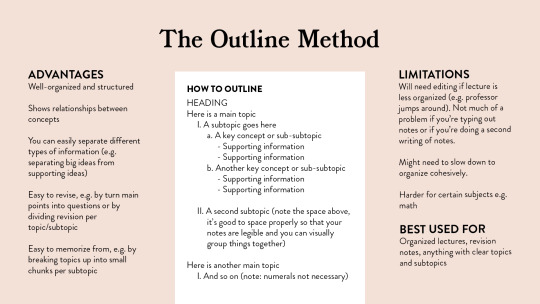
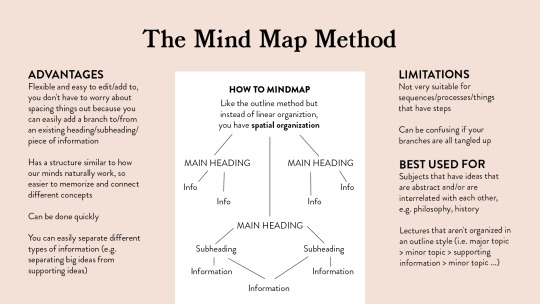

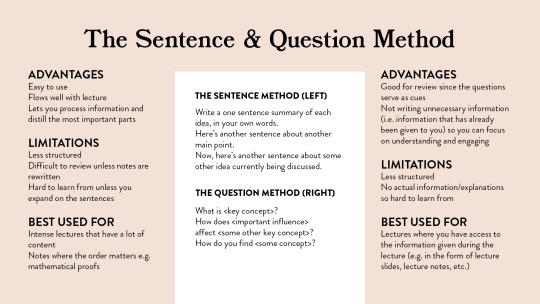
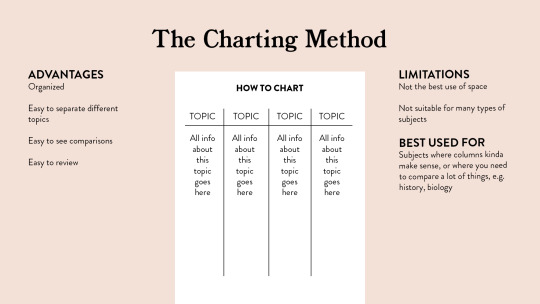


An Overview of Note-Taking Styles
Note-taking is one of the most essential skills a student should master. It allows you to record and review information to be used in the future. But what’s the best way to do so? Here’s an overview of note-taking styles that can help you maximize your learning!
56K notes
·
View notes
Text
Awesome Sites and Links for Writers
Just about every writer out there has several go-to websites that they use when it comes to their writing. Be it for creativity, writer’s block, to put you in the mood or general writing help. These are mine and I listed them in hopes that you’ll find something that you’ll like or will find something useful for you. I’ve also included some websites that sound interesting.
Spelling & Grammar
Grammar Girl — Grammar Girl’s famous Quick and Dirty Tips (delivered via blog or podcast) will help you keep your creative writing error free.
The Owl — is Purdue University’s Online Writing Lab (OWL) it’s a great resource for grammar guides, style tips and other information that can help with your writing, especially academics.
Tip of My Tongue — have you ever had trouble of thinking of a specific word that you can’t remember what it is? Well, this site will help you narrow down your thoughts and find that word you’ve been looking for. It can be extremely frustrating when you have to stop writing because you get a stuck on a word, so this should help cut that down.
Free Rice – is a great way to test your vocabulary knowledge. What’s even better about this site is that with every correct answer, they donate 10 grains of rice to the United Nations World Food Program. So, please disable your adblock since they use the ads on the site to generate the money to buy the rice.
HyperGrammar — the University of Ottawa offers up a one-stop guide for proper spelling, structure, and punctuation on this site.
AutoCrit — the AutoCrit Editing Wizard can check writing for grammar errors, clichés and other no-no’s. It also provides a number of other writing resources as well.
Writer’s Digest — learn how to improve your writing, find an agent, and even get published with the help of the varied blogs on this site.
Syntaxis — it allows you to test your knowledge of grammar with a ten-question quiz. The questions change every time you take the quiz so users are sure to be challenged each time around. It definitely helps writers know if there’s something that they need to brush up on.
Word Frequency Counter — this counter allows you to count the frequency usage of each word in your text.
Tools
Copyscape — is a free service that you can use to learn if anyone has plagiarized your work. It’s pretty useful for those that want to check for fanfiction plagiarism.
Write or Die — is an application for Windows, Mac and Linux which aims to eliminate writer’s block by providing consequences for procrastination.
Written? Kitten! — is just like Write of Die, but it’s a kinder version. They use positive reinforcement, so everytime you reach a goal they reward you with an adorable picture of a kitten.
Information & Data
RefDesk — it has an enormous collection of reference materials, searchable databases and other great resources that can’t be found anywhere else. It’s great to use when you need to find something and check your facts.
Bib Me — it makes it easy to create citations, build bibliographies and acknowledge other people’s work. This is definitely something that academics will love. It’s basically a bibliography generator that automatically fills in a works cited page in MLA, APA, Chicago or Turbian formats.
Internet Public Library — this online library is full of resources that are free for anyone to use, from newspaper and magazine articles to special collections.
The Library of Congress — if you’re looking for primary documents and information, the Library of Congress is a great place to start. It has millions of items in its archives, many of which are accessible right from the website.
Social Security Administration: Popular Baby Names — is the most accurate list of popular names from 1879 to the present. If your character is from America and you need a name for them, this gives you a accurate list of names, just pick the state or decade that your character is from.
WebMD — is a handy medical database loaded with information. It’s not a substitute for a doctor, but can give you a lot of good information on diseases, symptoms, treatments, etc.
Google Scholar - is an online, freely accessible search engine that lets users look for both physical and digital copies of articles. It searches a wide variety of sources, including academic publishers, universities, and preprint depositories and so on. While Google Scholar does search for print and online scholarly information, it is important to understand that the resource is not a database.
The Old Farmer’s Almanac — this classic almanac offers yearly information on astronomical events, weather conditions and forecasts, recipes, and gardening tips.
State Health Facts — Kaiser Family Foundation provides this database, full of health facts on a state-by-state basis that address everything from medicare to women’s health.
U.S. Census Bureau — Learn more about the trends and demographics of America with information drawn from the Census Bureau’s online site.
Wikipedia — this shouldn’t be used as your sole source, but it can be a great way to get basic information and find out where to look for additional references.
Finding Data on the Internet — a great site that list links that can tell you where you can find the inflation rate, crime statistics, and other data.
Word References
RhymeZone — whether you’re writing poetry, songs, or something else entirely, you can get help rhyming words with this site.
Acronym Finder — with more than 565,000 human-edited entries, Acronym Finder is the world’s largest and most comprehensive dictionary of acronyms, abbreviations, and initials.
Symbols.com — is a unique online encyclopedia that contains everything about symbols, signs, flags and glyphs arranged by categories such as culture, country, religion, and more.
OneLook Reverse Dictionary — is a dictionary that lets you describe a concept and get back a list of words and phrases related to that concept. Your description can be a few words, a sentence, a question, or even just a single word.
The Alternative Dictionaries — is a site that you can look up slang words in all types of languages, including Egyptian Arabic, Cherokee, Cantonese, Norwegian and many, many others.
Online Etymology Dictionary — it gives you the history and derivation of any word. Etymologies are not definitions; they’re explanations of what our words meant and how they sounded 600 or 2,000 years ago.
MediLexicon — is a comprehensive dictionary of medical, pharmaceutical, biomedical, and health care abbreviations and acronyms.
Merriam Webster Online – the online version of the classic dictionary also provides a thesaurus and a medical dictionary.
Multilingual Dictionary – that translate whatever you need from 30 different languages with this easy-to-use site.
Writing Software
Open Office — why pay for Microsoft products when you can create free documents with Open Office? This open source software provides similar tools to the Microsoft Office Suite, including spreadsheets, a word processor, the ability to create multimedia presentations, and more.
LibreOffice — is a free and open source office suite. It was forked from OpenOffice.org in 2010, which was an open-sourced version of the earlier StarOffice. The LibreOffice suite comprises programs to do word processing, spreadsheets, slideshows, diagrams and drawings, maintain databases, and compose math formula.
Scrivener — is not a free program, but it’s certainly a very popular one. It’s great for organizing research, planning drafts, and writing novels, articles, short stories, and even screenplays.
OmmWriter — is a free simple text processor that gives you a distraction free environment. So you can focus only on your writing without being tempted or distracted by other programs on your computer.
Evernote — is a free app for your smartphone and computer that stores everything you could possibly imagine losing track of, like a boarding pass, receipt, article you want to read, to do list, or even a simple typed note. The app works brilliantly, keeping everything in sync between your computer, smartphone, or tablet. It’s definitely a useful app for writers when you have ideas on the go.
Storybook — this open source software can make it easier to manage your plotlines, characters, data, and other critical information while penning a novel.
Script Frenzy — scriptwriters will appreciate this software. It offers an easy layout that helps outline plots as well as providing storyboard features, index cards, and even sound and photo integration.
Creativity, Fun & Miscellaneous
National Novel Writing Month — is one of the most well-known writing challenges in the writing community, National Novel Writing Month pushes you to write 50,000 words in 30 days (for the whole month of November).
WritingFix — a fun site that creates writing prompts on the spot. The site currently has several options—prompts for right-brained people, for left-brained people, for kids—and is working to add prompts on classic literature, music and more.
Creative Writing Prompts — the site is exactly what it says. They have 100+ and more, of prompts that you can choose from.
My Fonts — is the world’s largest collection of fonts. You can even upload an image containing a font that you like, and this tells you what it is.
Story Starters — this website offers over one trillion randomly generated story starters for creative writers.
The Gutenberg Project — this site is perfect for those who like to read and/or have an ereader. There’s over 33,000 ebooks you can download for free.
The Imagination Prompt Generator — Click through the prompts to generate different ideas in response to questions like “Is there a God?” and “If your tears could speak to you, what would they say?”
The Phrase Finder – this handy site helps you hunt down famous phrases, along with their origins. It also offers a phrase thesaurus that can help you create headlines, lyrics, and much more.
Storybird – this site allows you to write a picture book. They provided the gorgeous artwork and you create the story for it, or just read the stories that others have created.
Language Is a Virus — the automatic prompt generator on this site can provide writers with an endless number of creative writing prompts. Other resources include writing exercises and information on dozens of different authors.
Background Noise/Music
SimplyNoise — a free white noise sounds that you can use to drown out everything around you and help you focus on your writing.
Rainy Mood — from the same founders of Simply Noise, this website offers the pleasant sound of rain and thunderstorms. There’s a slide volume control, which you can increase the intensity of the noise (gentle shower to heavy storm), thunder mode (often, few, rare), oscillation button, and a sleep timer.
Coffitivity — a site that provides three background noises: Morning Murmur (a gentle hum), Lunchtime Lounge (bustling chatter), and University Undertones (campus cafe). A pause button is provided whenever you need a bladder break, and a sliding volume control to give you the freedom to find the perfect level for your needs and moods. It’s also available as an android app, iOS app, and for Mac desktop.
Rainy Cafe — it provides background chatter in coffee shops (similar to Coffitivity) AND the sound of rain (similar to Simply Rain). There’s also individual volume and on/off control for each sound category.
8tracks — is an internet radio website and everyone can listen for free. Unlike other music oriented social network such as Pandora or Spotify, 8tracks does’t have commercial interruption. Users create free accounts and can either browse the site and listen to other user-created mixes, and/or they can create their own mixes. It’s a perfect place to listen to other writer’s playlist, share yours or find music for specific characters or moods.
111K notes
·
View notes
Note
What are your favourite short stories that you have read?
Baba by K-Ming Chang, Dogs Go Wolf by Lauren Groff, Cathedral by Raymond Carver, Mothers, Lock Up Your Daughters Because They Are Terrifying by Alice Sola Kim, Save the Reaper by Alice Munro, Fairy Tale by Alexandra Kleeman, St. Lucy's Home for Girls Raised by Wolves by Karen Russel, Starver by Daisy Johnson, Undoing Wolf by Reanna Alder, The Test by Samanta Schweblin, Traplines by Eden Robinson, Mountain Under Sea by DW Wilson, House Clonws by Bill Gaston, and Belles Letters by Nafissa Thompson-Spires are all fantastic! Also @coffeeandcalligraphy's story Primary Organs is an all-time fave. So good!!! My friend Sophie (who you might remember from the poetry video we did!) also has a story coming out in The Common soon called Lyuba Boys that is like my fav story it's so good. The world is not ready for this story.
Probably more haha but those are the ones that first come to mind!!
66 notes
·
View notes
Note
Do you have any short fiction anthology recommendations? Or even individual short stories?
Sure! How to Pronounce Knife by Souvankham Thammavongsa is my absolute favourite collection. “Slingshot” is my favourite short story from the collection (and favourite short story of all time) and I also love “Randy Travis”. Dead Girls by Emily Geminder is also a great collection! The title story is still one of my favourites to this day.
As for individual stories, the list goes as such (linked where applicable)
The Extra by Michael Christie
Tapka by David Bezmozgis
L’Etranger by Eliza Robertson
Sea Life by Eliza Robertson
Yeti Hunting on Mt. Seymour by Sophie Crocker
We Walked on Water by Eliza Robertson
Father’s Milk by Louise Erdrich
Simple Recipes by Madeleine Thien
Doppel by Sharon Bala
Six Things My Father Taught Me About Bears by Leah Mol
Cathedral by Raymond Carver
Cannibal by Natanya Ann Pulley
What Can You Do With A General by Emma Cline
Kids in Kindergarten by Corinna Chong
Also love every story by @shaelinwrites which are all linked HERE. “Wishbone”, “I Will Never Tell You This” and “Hold Me Under Till I See the Light” particularly inspire me always!
I’ve read so many short stories, so I may have forgotten some, but the above are some that have particularly stuck with me/that I revisit often! I’ve been planning a video for months where I hoped to do a breakdown of why many of these stories are my favourites, techniques used, etc. Is there anything you’d like me to cover?
41 notes
·
View notes
Text


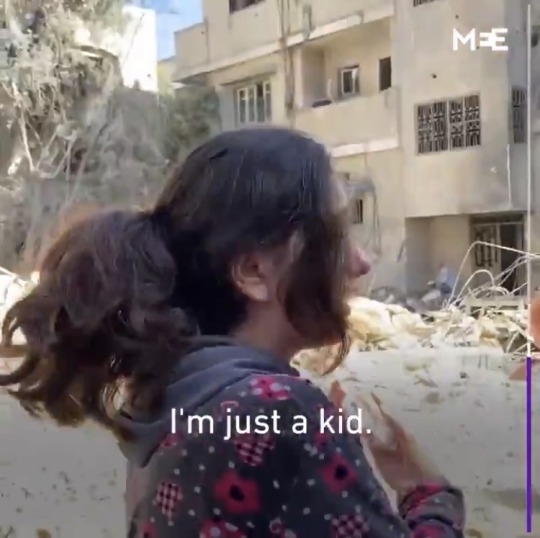

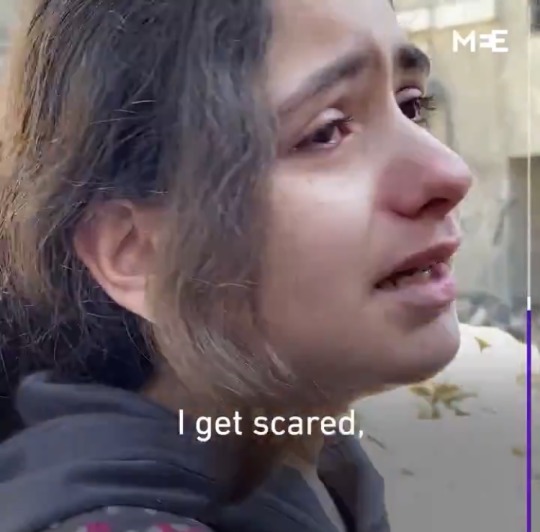

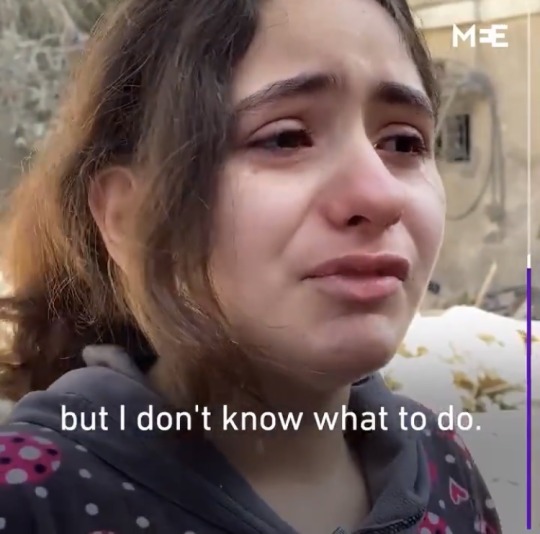
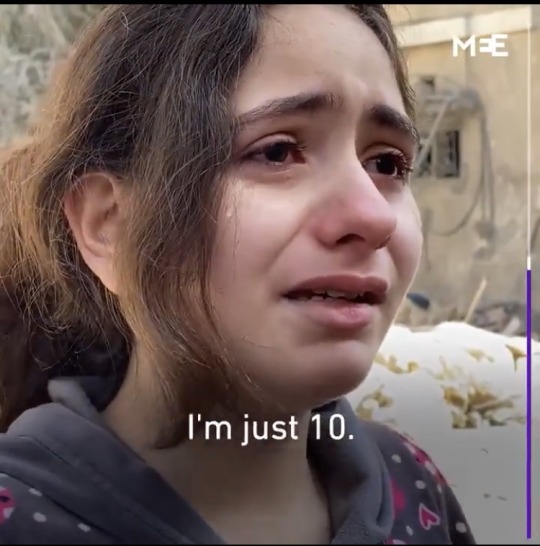
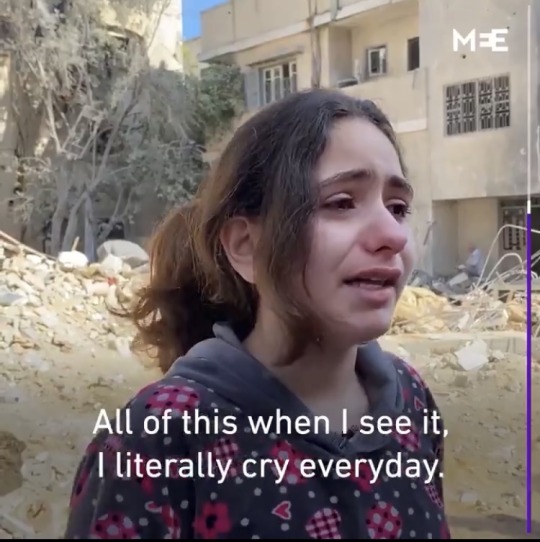
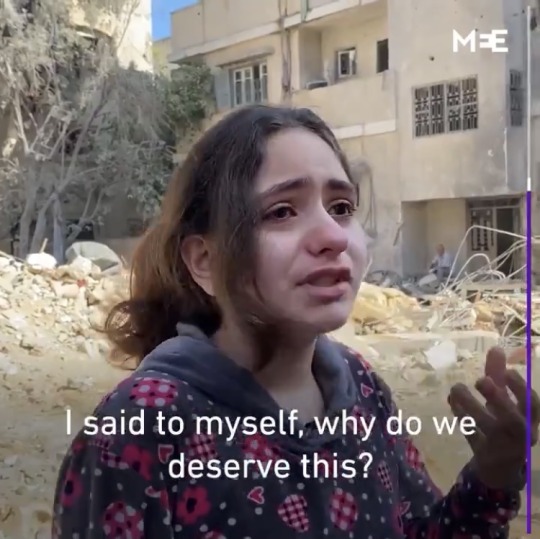
Nadine Abdel-Taif, 10, whose home in Palestine was destroyed by Israeli bombing
76K notes
·
View notes
Text
Palestinean Children Relief Fund
The children of Gaza live in a continuous humanitarian crisis, with no clean water, little electricity, poor health services, and food insecurity. For 30 years, PCRF has been on the ground providing a variety of direct humanitarian aid programs for thousands of sick and injured children in the enclave.
These include sending hundreds of injured and sick kids abroad for free medical care, sponsoring hundreds of international volunteer doctors and nurses to go there each year to treat children and train local doctors, building Gaza's first and only pediatric oncology department, and running several different humanitarian programs and projects on the ground.
Please consider donating here, or to any of the following organizations during these acts of what can only be called ethnic cleansing & terrorism:
https://www.palestinecampaign.org/
https://www.ifcharity.org.uk/
Gaza Emergency Meals
2K notes
·
View notes
Text
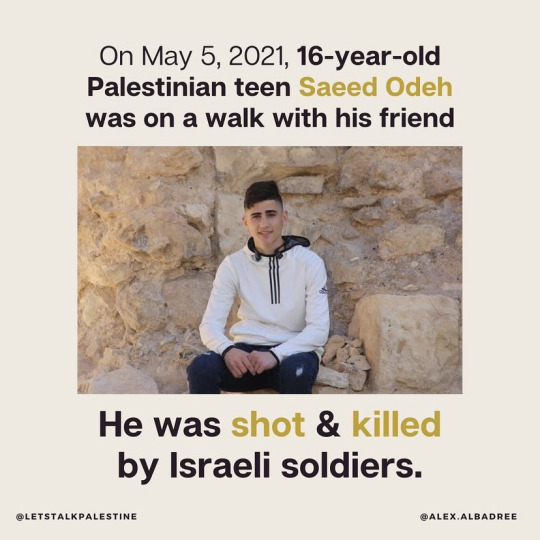
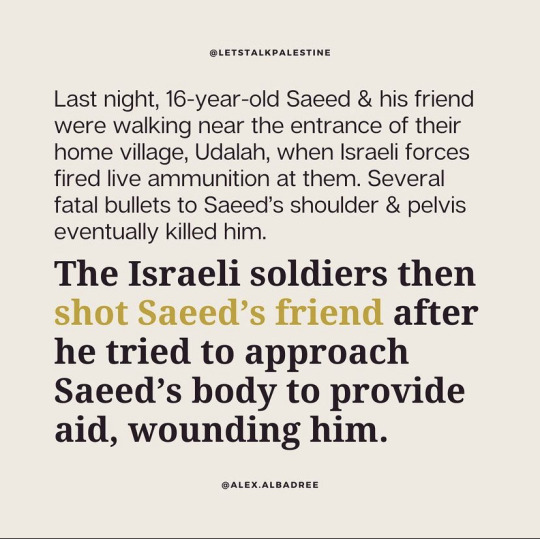
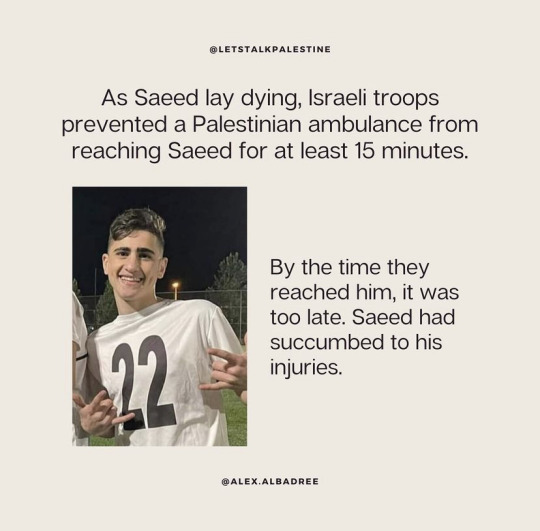
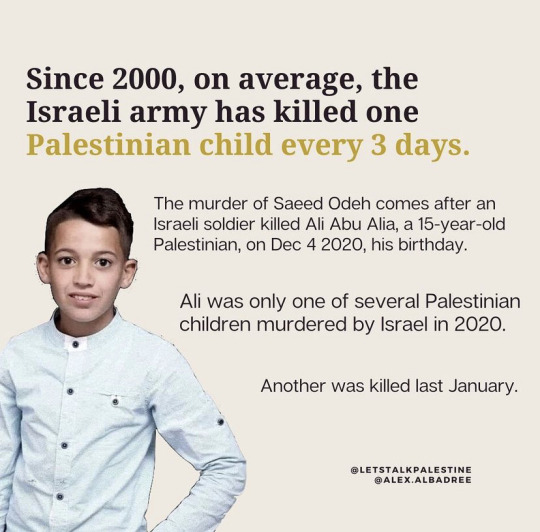
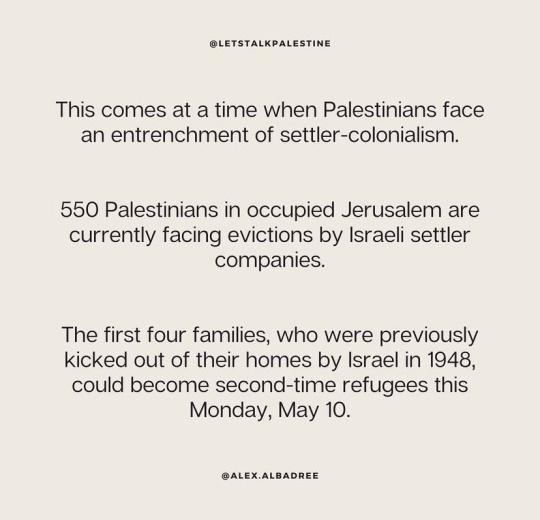
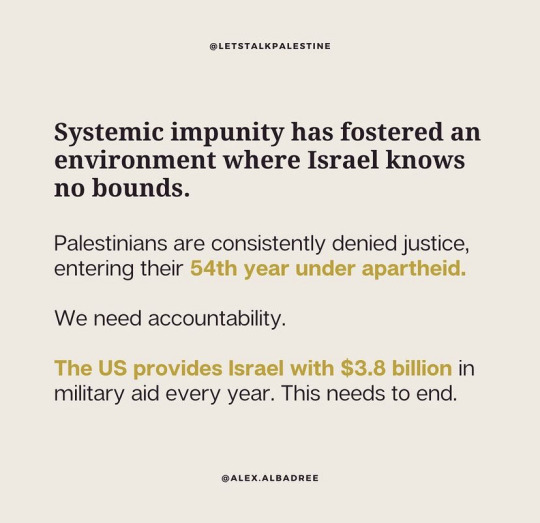
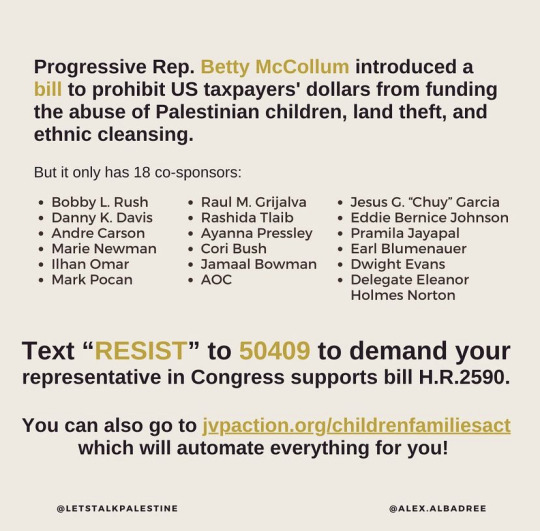
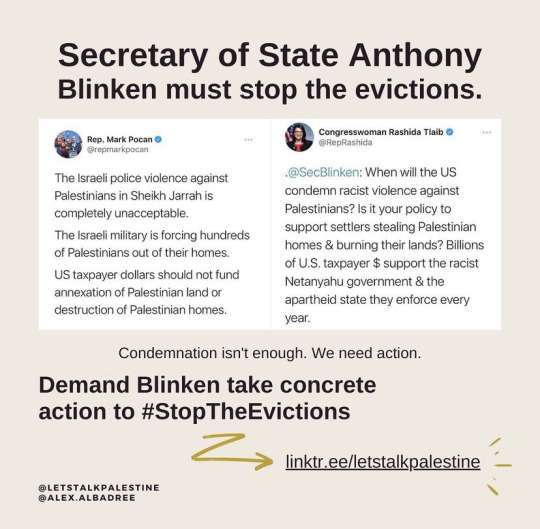
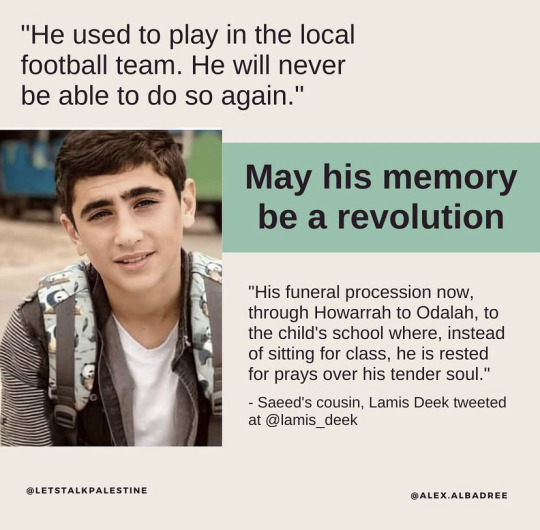

X
The murder of Palestinian children and ethnic cleansing of Palestinian communities is being supported by the US. Americans' taxes are funding these atrocities.
Please include Palestinians in your activism 🇵🇸❤️
Our hearts go out to Saeed Odeh's family, to the residents of Sheikh Jarrah & Silwan resisting ethnic cleansing, and to every Palestinian in exile waiting to return to their homeland 🇵🇸❤️🕊
29K notes
·
View notes
